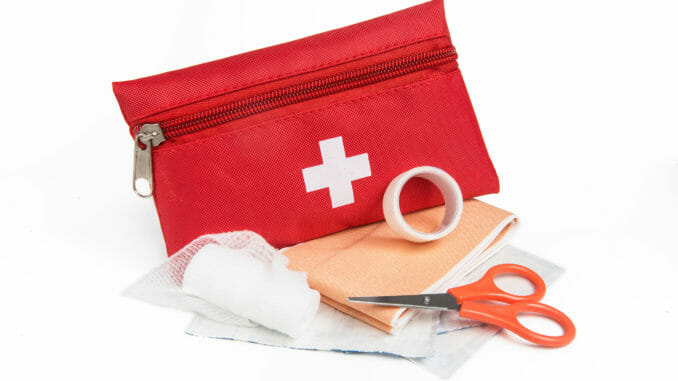
Before you head out for your first trucking job, it’s important to recognize what becoming an over-the-road (OTR) trucker means for your lifestyle. Long-haul trucking means you can’t always go to your favorite gym or plan your nutritious home-cooked meals. Staying away from home for weeks at a time includes unique challenges to living a healthy life.
Overall job stress, long hours sitting behind the wheel, lack of exercise, unhealthy diet, and disrupted sleep patterns all threaten a trucker’s health. It can also be difficult to maintain good hygiene and always have available first-aid.
With these essential tips for good trucker health, rookie drivers can develop habits that can protect and maintain their wellbeing. Keep these habits, and you can stay healthy well into your truck driving career:
1. Reduce Stress.
Over-the-road trucking can be a stressful career. Just driving a 75-foot, 80-ton vehicle through heavy traffic creates stress. Two major causes of this stress are slow traffic and tight schedules. Throw in bad weather—slick roads, poor visibility—and the stress level skyrockets.

Properly managing the stress of OTR driving begins with the right attitude. Call it “professionalism” because it’s part of the job.
You’re a professional driver, so you’ll encounter traffic problems and motorists who make mistakes or otherwise drive dangerously. These are normal working conditions.
Getting angry or stressed about them doesn’t make sense. Stress also raises your blood pressure and leads to problems later down the line.
Plan your trips to reduce stress. Allow extra time for whatever awaits down the road. Get as close to your destination as possible as early as possible. Consider weather (where you are and where you’re going), traffic slowdowns (due to rush hour or construction), fuel stops, speed limits, and the highway itself (hills, curves, etc.). Perform a good pre-trip inspection to avoid breakdowns.
Keep in touch with your shippers and receivers. See if you can arrive early. When you arrive, take a look at their lots and dock situation. Are they crowded and busy? Will you wait in line or at a guard gate? Do they have parking? If the schedule is tight and you run into problems, call your driver manager.
Also, watch your caffeine intake from coffee, soft drinks, and energy drinks. Caffeine is a physical and mental stimulant. It creates and increases stress.
2. Take Breaks to Reduce Fatigue.
Road fatigue is a major threat to trucker health. Driving OTR takes a high level of alertness for long periods of time. This causes physical and mental fatigue.
Long-term, chronic fatigue can cause exhaustion that “a good night’s sleep” won’t cure. Minimize stress by taking breaks along the road: 10 minutes out of the truck, walking around a rest area, or checking out books and CDs in a truck stop. During home time, get rest, relaxation, and recreation. Don’t party the night before you go back to long-haul driving.
3. Use Good Posture and Adjust Your Seat.
Sitting for long periods impedes blood circulation. It’s very bad for truckers’ health. Improve circulation by properly adjusting the seat. Find the “sweet spot.”

With feet flat on the floor, tilt the seat forward and adjust the height until vision is good in both mirrors, the front edge of the seat barely touches under your legs, and your knees are bent at slightly less-than 90-degrees.
Maintain good posture. Don’t slouch. Sit upright with head erect. Hands should be at ten o’clock and two o’clock on the steering wheel.
Feet should be straight below knees and flat on the floor. Adjust the seat bottom and back to support hips and spine.
This all sounds ridiculous, but back problems are a real and persistent threat to trucker health. Take it seriously!
Seat technology is amazing. Seats absorb a lot of the impacts as the truck rolls down the road. However, prolonged sitting alone can cause back problems, and continuous bouncing—although softened by the seat—can “load the spine” with compression. The best way to relieve the compression is exercise.
4. Exercise.
It’s difficult to exaggerate the benefits of exercise to a trucker’s health. As noted, short walks reduce stress and fatigue and improve circulation. They also burn excess calories. You need specific exercises, however, to work on your back and abdominal muscles (core muscles).
These exercises are easy, simple, and take about 20 minutes once or twice daily. They include hamstring (upper thigh and buttocks) stretches, modified leg lifts and sit-ups, and other stretches and repetitions that decompress your spine and strengthen and maintain upper/lower back and stomach muscles. You can perform them in the truck.
If you have questions about exercising, see an exercise therapist or an orthopedic physician. Learn the exercises that work best. Make sure you can do them without injury. Trucking companies are concerned their truckers’ health. Many companies hire therapists and orthopedic physicians to create exercise plans printed in pamphlets or on CDs, free for the asking. The Internet also has millions of articles and videos about exercising.
Some truck stops have exercise rooms with tread mills, weight machines, benches, and stationary bicycles. If not, just take a walk or jog around the stop. Many truckers don’t exercise, and they experience serious health issues.
As an OTR trucker, you choose to exercise or not exercise. The decision falls on you. Choosing to exercise after a long day of driving can be hard, but you don’t want to risk health problems that might hurt you for the rest of your life.
5. Eat Healthy: The Trucker Diet.
Eating healthy is a popular subject. Thousands of TV shows, magazines, news articles, and schools provide information about healthy diets. Trucking companies often provide healthy diet information during orientation. Some hire nutritionists to teach truck drivers how to eat and drink wholesome, nourishing, healthy foods and beverages.
Without the comfort of your home kitchen and local grocery store, choosing your food and beverages takes on extra importance when you take a job in OTR trucking. Most truckers constantly eat snacks and drink sugary beverages while driving to stay alert and pass the time. They also eat fast food and junk food at truck stops.
Poor diet can lead to diabetes, back and heart problems, increased fatigue, exhaustion, and sleep apnea, to name a few. Carefully choosing what you eat is essential to a truckers’ health.
Healthy diet choices are obvious and mostly common sense. Don’t drink high-calorie sodas and energy drinks. Instead, drink water—at least two liters a day. Stay hydrated. This will also help to control your appetite on the road. If you need to add some taste to your tongue, go for unsweetened, low-carb beverages.
Caffeine is useful to keep your eyes open on the road, but as previously mentioned, too much causes tension, stress, and restless sleep later on. For snacks, choose fresh or dried fruits and vegetables, granola bars, or plain nuts. Don’t choose candy, cookies, cakes, or chips.
For meals, go with veggies or fruits and low-fat protein—lean meat—and avoid carbohydrates like bread and potatoes. Try low-salt meals, and eat smaller portions.
Most trucks have refrigerators, and 12-volt coolers can store fruits, vegetables, and other perishables, such as whole-wheat bread and low-salt/fat sandwich meats and cheeses. Ask a physician or nutritionist about vitamins and health supplements. And if you eat in the truck, clean up after yourself.
6. Get Enough Sleep.
Trucking OTR includes long hours and interrupted sleep patterns. You’ll drive late at night, overnight, and very early in the morning. Getting enough sleep is a safety issue.

A big tip is to maintain regular sleep patterns whenever possible. When your regular sleep patterns are interrupted, get sleep when you can.
If you’re too tired to drive, tell your driver manager. Then park safely and get some sleep. Don’t risk the safety of yourself or others when driving an 80,000 pound truck.
If it’s daytime, shades are handy. You can use ear plugs but be careful. Ear plugs might prevent you from hearing something you need to hear, such as your alarm, warnings, and engine problems.
OTR trucking usually includes some overnight driving. Some like it because of the lack of traffic at night, but most truckers don’t enjoy it.
If driving overnight is a problem, ask your driver manager to keep you off overnight loads. Usually it’s part of the job. Don’t volunteer for dedicated overnight assignments. Team driving means running 24/7 when under a load, so find ways to get sleep when you’re not the one driving.
Tired truckers are targeted by activist and reform groups as a deadly roadway menace, and rightly so. If you fall asleep on the road, lives and families are at stake. Get enough sleep. Don’t drive tired.
7. Maintain Yourself with Good Hygiene and Doctor Visits.
This is an important, yet overlooked, part of trucker’s health. Brush your teeth and wash your face every day. Daily showers aren’t always necessary, but showering at least a few times a week is part of good health.
Also, get annual physical check-ups and see a dentist twice a year, too. Illness or a toothache on the road, thousands of miles from home, can create problems.
8. Bring a First Aid Kit.
Your first-aid kit should include over-the-counter pain killers, scissors, e nail clippers, athlete’s foot cream or spray, bandages, gauze, tape, disinfectant, eye drops, healing salve, cotton balls and swabs, tweezers, a magnifying glass, a small flashlight, cloth bandages, safety pins, small splints, rubber bands, and a roll of paper towels.
As an OTR trucker, you or another driver might get injured in the middle of nowhere. You’ll want to have first aid available. A well-stocked first aid kit can prevent infection or further injury, and in some cases, even save a life. Review basic first-aid. Know what to do if you or somebody else gets hurt.
9. Pack Proper Clothing.
Proper clothing is also a part of trucker’s health. Wear close-toed work shoes with socks. Most trucking companies, shippers and receivers require them anyway. Loosen them slightly when driving.
During winter, carry thick socks, long underwear, scarves, insulated gloves and mittens, sweaters or sweatshirts, heavy work trousers, and a heavy coat. Always carry rain gear. Staying warm and dry can help your immune system ward off illness.
Summary
Over-the-road trucking features a combination of a unique lifestyle and physical demands that makes truckers’ health an important issue. Truckers must be prepared to maintain and protect their health. Minimizing stress, exercising, keeping a healthy diet, getting sufficient sleep, proper hygiene, and first aid are all part of an OTR trucker’s professional responsibilities.

Thank you. I am new to the trucking industry and your words gave plenty of helpful tips that I will surely utilize throughout my career.